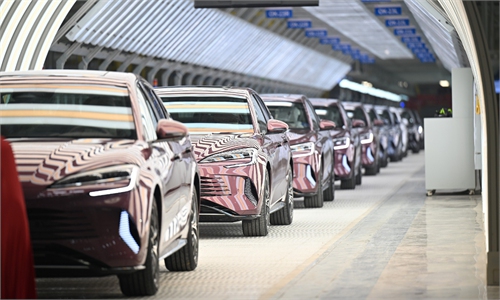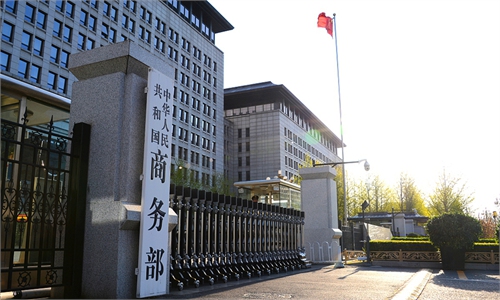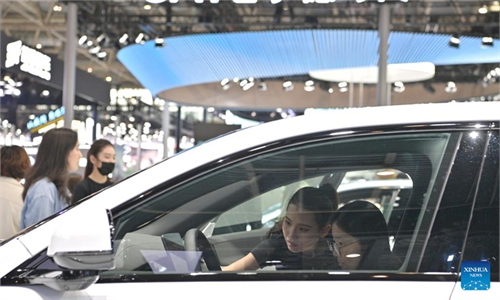Exclusive: EU's FSR violates multilateralism, erects barriers for Chinese companies, authoritative experts say
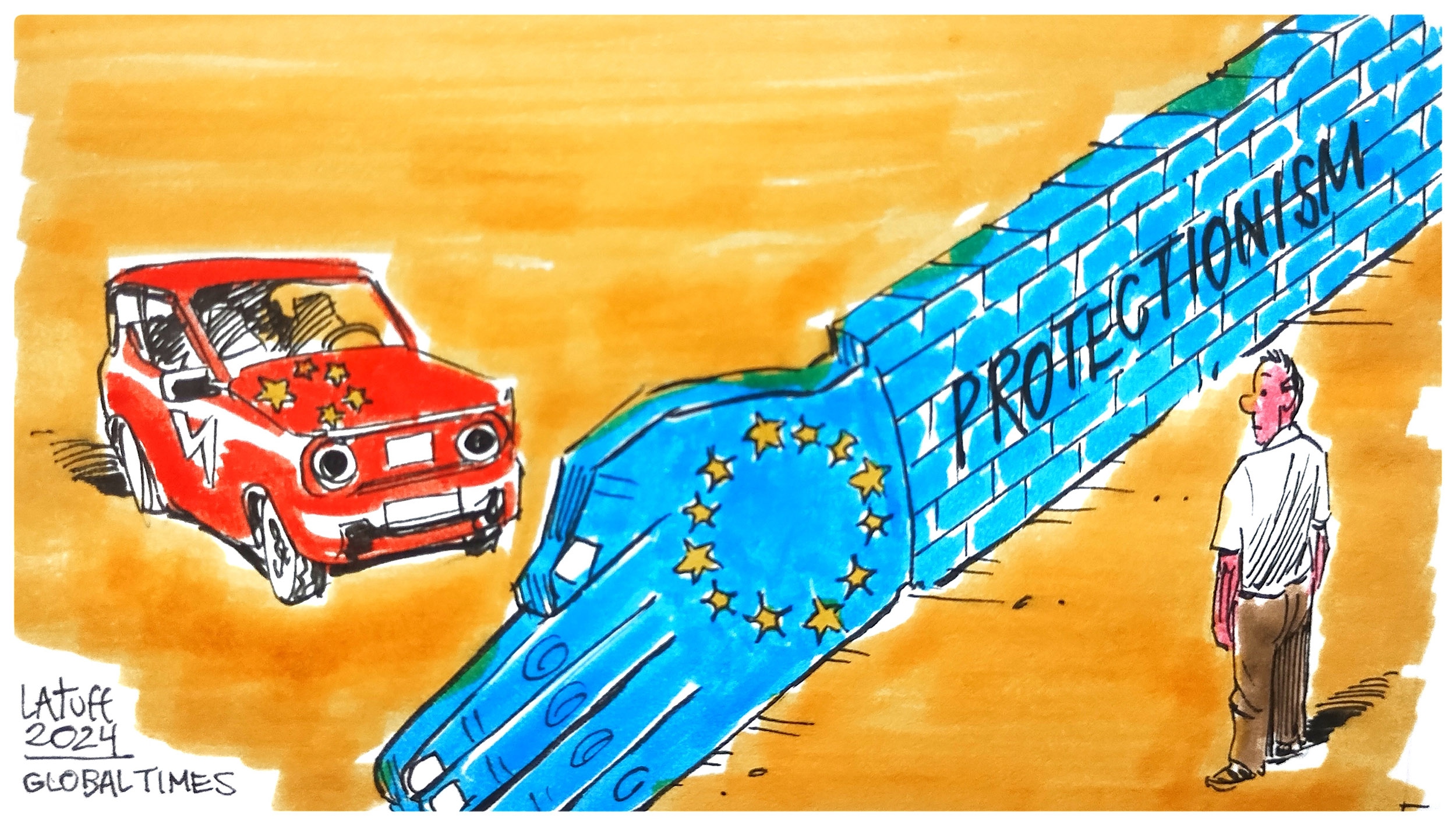
Cartoon: Carlos Latuff
Editor's Note:
As China's economy continues to rise globally, it has also become increasingly intertwined with the world economy. However, with such a close link also come frictions, especially with a rising tide of protectionism and geopolitical hostility in some advanced economies. Certain countries and regions, in their attempt to contain China's rise, have tried to distort the facts, disregard basic economic laws and international free trade rules, and stir up tensions. To offer an objective and in-depth coverage of the top economic news in China and around the world, the Global Times is launching this special column "China, World Economy in Focus." This is the first installment of the column - an exclusive piece of authoritative Chinese experts' view on the EU's discriminatory actions targeting Chinese goods and firms.
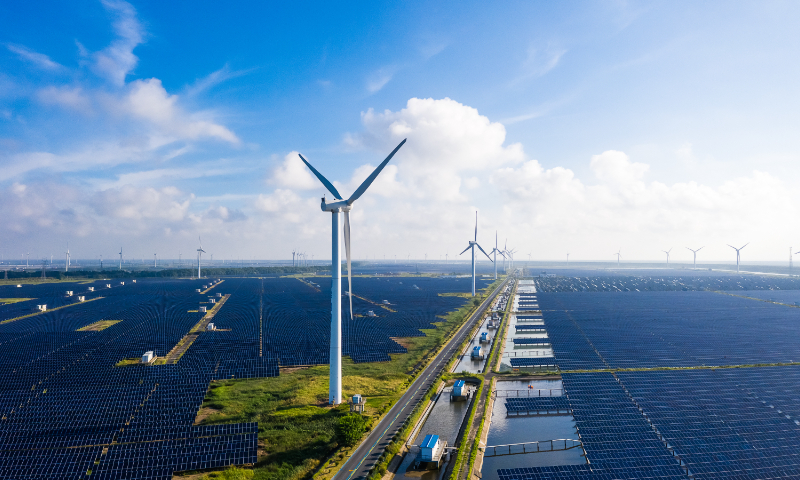
An electricity farm powered by wind and solar energy in Yancheng, East China's Jiangsu Province File photo: VCG
As the world closely watches the EU's imposition of additional tariffs on Chinese electric vehicles (EVs), another "arrow of trade protectionism" shot by the EU toward China continues to unleash its "destructive power."
Since February, Chinese electromechanical products such as railway locomotives, photovoltaics, wind power and security inspection equipment have been successively investigated by the EU. Among them, CRRC Qingdao Sifang Co was forced to withdraw from a 610 million euro ($653.95 million) tender project in Bulgaria. Subsequently, Shanghai Electric Group and LONGi Green Energy Technology Co were also forced to suspend their bids for a photovoltaic park in Romania. Chinese security inspection company Nuctech Co's offices in Poland and the Netherlands were subjected to surprise inspections by the EU.
The investigations initiated by the EU under its self-made Foreign Subsidies Regulation (FSR) have obvious protectionism and discriminatory characteristics on Chinese companies, further exacerbating the risk of trade frictions between China and the EU.
Experts interviewed by the Global Times said that the EU's actions are conducive to neither Chinese enterprises nor the development of the EU's green economy, leading to an increase in the cost of green development, which will ultimately be bore by EU consumers and businesses. The experts believe that the EU should follow WTO rules, resolve differences through dialogue and consultation, bring the China-EU ties back on the right track, avoid escalating trade frictions out of control, and jointly promote stable and far-reaching economic and trade cooperation between China and the EU.
Violating multilateralism by creating a set of trade protectionist tools
According to media reports, in February, CRRC Qingdao Sifang Co withdrew from a project in Bulgaria to supply 20 electric trains worth around 610 million euros. The reason was that the EU believed that the Chinese company was using subsidies from the Chinese government to "distort" the EU single market, prompting an "unprecedented" subsidy investigation.
This was the first investigation under the EU's FSR, which came into effect in 2023 and directly targeted Chinese companies. Subsequently, the EU adopted the same approach and launched intensive investigations into Chinese companies in the new energy and security inspection sectors based on the newly implemented regulation.
From 2022 to 2023, the EU successively introduced the "Regulation on foreign subsidies distorting the internal market" and its accompanying implementation rules and guidelines, collectively known as the FSR. The regulation specifically targets foreign companies that receive "foreign subsidies" in investment and government procurement, which is deemed to have distorted the EU internal market. The EU requires these companies to declare their subsidy situation and has the authority to initiate subsidy investigations. Based on the investigation results, the EU can even require companies to withdraw from investment and procurement projects. If the EU deems that a company has not cooperated in declaring subsidies, punitive measures may be taken against the company.
Since the implementation of the FSR, Chinese companies have become the biggest victims. The China Chamber of Commerce for Import and Export of Machinery and Electronic Products (CCCME) stated on June 25 that the EU investigations not only hinder Chinese products and services from entering the EU market and Chinese companies from investing in Europe, but also damage the market competitiveness of Chinese enterprises, affecting the overall economic and trade cooperation between China and the EU.
The CCCME further stated that it was actively using legal means to protect the interests of relevant industries and enterprises. He Yadong, spokesperson of China's Ministry of Commerce, also said on June 27 that the ministry had received the relevant application materials submitted by the CCCME for an investigation into trade barriers, and was conducting a review in accordance with the law.
During the interviews, multiple industry experts told the Global Times that the FSR was not established in accordance with international multilateral trade rules, but essentially a self-created tool that is highly targeted and discriminatory against Chinese companies. Not only does it exaggerate and stretched the concept of the WTO's definition of anti-subsidy, but the criteria are also vague, the enforcement procedures are not transparent, and there is a lack of fairness, setting up numerous obstacles for Chinese companies to invest and participate in government procurement in the EU.
During an interview with the Global Times, Ji Wenhua, a professor at the School of Law at the University of International Business and Economics, pointed out that the FSR is a comprehensive regulatory tool created by the EU. The concept of "foreign subsidies" defined by FSR is broader than the rules of the WTO, and is unreasonable and unclear in the definition of some key concepts.
Ji noted that according to relevant WTO rules, only financial assistance that confers a benefit constitutes a subsidy, with strict requirements for determination. However, the EU's definition of subsidies is much broader and more arbitrary, even including the "financial assistance amount" of companies and affiliated companies.
The Global Times noticed that in the investigation of the Bulgarian electric train project, the EU has classified all government procurement contracts obtained by CRRC Qingdao Sifang Co as government financial assistance, leading to the conclusion that "the enterprise group has received a total of 7.5 billion euros in financial assistance," fully exposing the above-mentioned characteristics of the EU's definition of subsidies under the FSR.
On April 3, the EU announced that it would launch a thorough investigation into the bidding process for a solar photovoltaic park in Romania. Three weeks later, LONGi Green Energy Technology Co and Shanghai Electric Group withdrew from the investigation, citing the EU's unfair, opaque, and discriminatory enforcement practices. In this project, only Chinese companies were targeted for investigation, while other non-EU entities were not subjected to similar scrutiny.
Ji told the Global Times that there are problems with the fairness and transparency of the EU's FSR investigation procedures. He believed that the European Commission (EC), the executive body of the EU, has been given excessive discretion under the FSR, leading to selective enforcement. These key provisions of the FSR are in conflict with basic principles of the WTO.
Discriminatory practices targeting Chinese companies
Zhou Xiaoyan, vice president of the China Council for International Investment Promotion, told the Global Times that the EU is a "sophisticated player" in the formulation of rules, able to hide and package its true intentions in seemingly fair terms. She believed that although the EU's FSR applies to all foreign companies outside the EU and appears non-discriminatory, the legislative intent and terms of the FSR are actually specifically targeted at China's economic model, with Chinese companies being the main focus of investigation and restrictions.
Zhou also pointed out that in practice, the EU's investigations into Chinese companies are discriminatory and the enforcement is selective. "The EU's expansionist legislation and investigative practices fundamentally violate the nondiscrimination principle and relevant rules of the WTO," said Zhou.
Zhou also noted that the main target of the EU's FSR is Chinese companies, with the aim of excluding Chinese companies from EU investment projects and government procurement projects, effectively setting up investment and trade barriers against Chinese companies.
Ji also said that, based on the practice of the EU's investigations, the first three in-depth investigations were all targeted at Chinese companies, showing a clear discriminatory nature.
When it comes to investigation practices, Ji said that, based on the existing information, the EU's investigation process is not transparent and lacks predictability, making it difficult for companies to defend their rights. In addition, the EU's FSR rules themselves and the practices in existing investigations may violate the EU's obligations under the WTO (such as taking measures other than imposing anti-subsidy duties on Chinese imported goods, or restricting Chinese company's entry into the open service industry that the EU has promised).
Zhou stated that in the FSR investigation by the EU, excessive and broad information collection requirements and sensitive disclosure of commercial data are imposed on Chinese companies, and the EU does not give companies sufficient time to prepare their responses, making it difficult for companies to complete the complex questionnaires, bringing huge difficulties for Chinese companies to respond to the investigation.
Chinese companies are required to submit various cumbersome questionnaires and complex proof documents as requested by the EU investigation authorities. In addition, the EU's investigation authorities unreasonably add supplementary questionnaires, making it unbearable for companies. For example, in the case of the Bulgarian electric train investigation, Chinese companies were given only three days to submit relevant information.
Due to the targeted nature of the investigations, even if Chinese companies fully cooperated, they still end up with predetermined results. In this difficult situation, some Chinese companies are overwhelmed and have no choice but to withdraw from the investigation.
In addition, the EU's unreasonable demands for Chinese companies to provide a large amount of information will inevitably involve issues of information and data security. "You cannot guarantee that the submitted information and data will not be distorted and used by the EU in other scenarios in the future," Zhou said. "The more information and data submitted, the greater the information security risk. When companies are unable to provide, they will be deemed uncooperative by the EU investigative authorities for not fully providing or providing inaccurate information, leading to punitive results. In this situation, companies can only choose to withdraw from the investigation."
The EU's FSR focuses on investigating the sources, composition, and purposes of funding for companies investing and acquiring in the EU, as well as participating in public procurement. The investigation period covers the funding support received by companies in the first three years. The EC also has the authority to investigate companies it deems problematic (causing distortions in the EU internal market), including those that have already acquired investments or won procurement bids.
"The EU's FSR investigation has brought significant uncertainty and unpredictability to Chinese companies investing and acquiring in the EU, severely disrupting their investment and business activities. This has made many Chinese companies very concerned about the business environment in the EU and has also created obstacles for China-EU economic and trade cooperation," Zhou stated.
Who is responsible for the consequences of trade protectionism?
As Chinese companies withdraw from the EU's so-called FSR investigations and the EU launches new subsidy investigations into Chinese new-energy and other products, the risk of economic and trade frictions between China and the EU has suddenly increased, posing a serious challenge to the economic and trade cooperation between the two sides.
Zhang Wei, deputy director of the Chinese Academy of International Trade and Economic Cooperation, said in an interview with the Global Times that the barriers set up by the EU's FSR will seriously hinder Chinese products and services from entering the European market, and will also have a negative impact on Chinese companies investing and operating in Europe.
From an industrial perspective, this may delay the EU's development of a green economy, increase the cost of its green development, and hinder the promotion of the global green-energy industry that will allow the world to share the fruits of development in the new-energy industry and inject certainty and stability into world economic development, according to Zhang.
"From the perspective of economic and trade cooperation, the restrictive measures taken by the EU will increase the risk of trade frictions, hinder the construction of a better production and supply chain system between China and Europe, and impede the high-quality development of bilateral economic and trade cooperation," Zhang said. In the long run, the actions of the EU will impact the global economic and trade order, and are not conducive to establishing a more liberalized and convenient global economic and trade cooperation system.
Zhang further pointed out that under the conditions of economic globalization, the world economy has long been an inseparable whole, with production and consumption being globalized, requiring effective matching and adjustment of supply and demand on a global scale.
Trade protectionism, by adopting restrictive measures and delineating a "small circle" for national development, goes against the basic laws of international division of labor, inevitably leading to redundant construction, inefficiency and high costs. It is not in line with the development interests, and cannot fundamentally solve problems. Enterprises and consumers will be forced to bear the "prices" of trade protectionism, said Zhang.
Zhang said that, based on current experience, Chinese companies are playing a positive role in promoting industry development through international cooperation in advantageous production capacity by means of overseas investment. Chinese companies are sharing technological achievements with relevant countries and jointly building industrial systems, not only promoting the development of local industries, but also boosting local economic employment. For example, BYD's electric bus factory in Hungary has a local employee rate of over 90 percent, and CATL's battery factory in Germany has created 1,500 jobs for the locals. Therefore, all countries should provide fair market access opportunities for all enterprises and make positive contributions to creating a more diverse global industrial division of labor system.
"There are still vast areas of cooperation between China and Europe, and expanding cooperation opportunities is more effective than taking restrictive measures. China and Europe have complementary advantages and huge space for cooperation. In the future, bilateral economic and trade cooperation should be further deepened, continuously expanded, and development dividends should be shared together," Zhang stated, noting that China will also, in an open manner, share the market space and industrial development opportunities with European companies.
However, Zhang also emphasized that China does not accept any unilateral restrictive measures from any country. If there will be scenarios that China does not want to see, China will, in accordance with international rules, take reasonable, legal, and necessary countermeasures within the framework of the WTO to safeguard the legitimate rights and interests of Chinese enterprises, said Zhang.
Zhang affirmed that the European side should take into account the legitimate concerns of both parties, follow the WTO rules, properly handle differences through dialogue and consultation, take the interaction between China and Europe to the correct way, avoid the escalation and loss of control of trade frictions, and jointly promote stable and long-term economic and trade cooperation between China and Europe.
